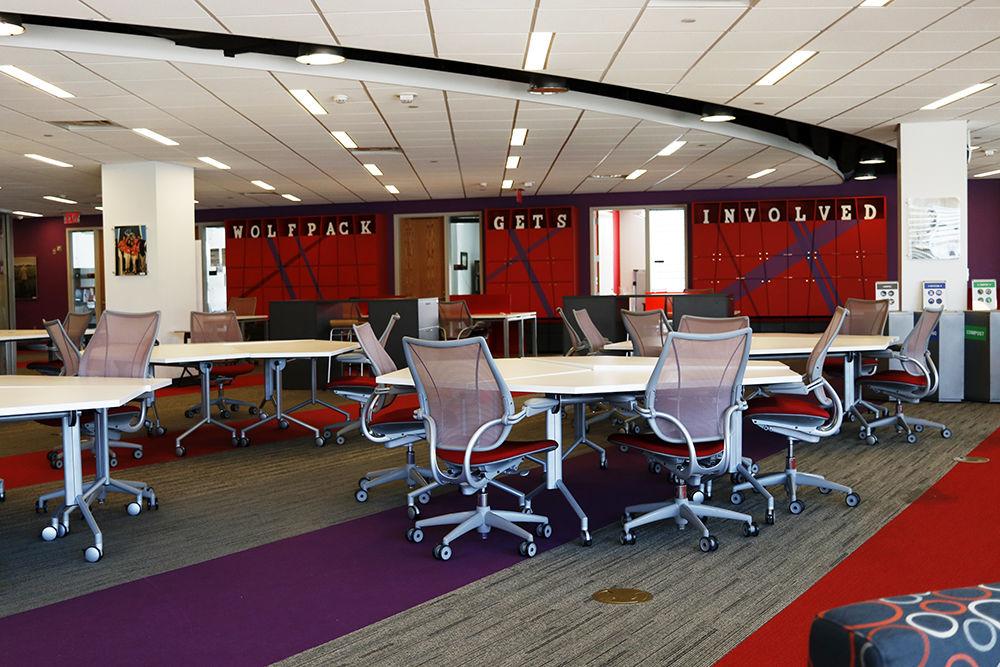
Connor Smith // Archive
The Student Involvement Center is located at Talley Student Union room 4210 and is a part of DASA.
On Sept. 29, the third and final candidate for the vice chancellor and dean of the Division of Academic and Student Affairs (DASA) position, Doneka Scott, participated in the same open forum and Q&A presentation the previous candidates, Lisa Zapata and Steven Girardot, underwent earlier this month. Scott has worked as vice provost of undergraduate education and student success at the University of Oregon since February 2019.
Scott’s virtual interview process spanned Sept. 28-29. Lisa Zapata, current interim vice chancellor and dean of DASA, is the only internal candidate for the position. Girardot and Scott were not announced as finalists for the position until the day prior to their interview process.
According to Louis Hunt, senior vice provost for enrollment and management services, the open forums were planned so the entire campus community could provide feedback and ask each candidate questions. Hunt also said the provost and chancellor will make the final decision regarding who will be hired.
During the open forum, Scott spoke on the topic, “DASA, building on success,” the same topic assigned to the previous two candidates. The forum was livestreamed through PackTV and is available upon request by contacting Bona Bame in Executive Search Services.
Background and Career
Scott is from Port Huron, Michigan and was raised in a working class family as the youngest of five girls. As a Black woman who did not grow up in a diverse community, going to college and being surrounded by a Black community was a very transformative time in her life. She recalls being first interested in higher education when then University of Michigan Vice President for Student Affairs Maureen Hartford spent a week in the spare bunk in her dorm room to “get an authentic college experience.” According to Scott, she told Hartford that she wanted her jobs after spending that week with her.
Scott earned a Bachelor of Science in chemical engineering and a Doctor of Pharmacy, both from the University of Michigan. She later received a Master of Arts in higher and postsecondary education, also from the University of Michigan. Scott worked at the University of Minnesota from June 2005 – July 2016. She began at the University of Oregon in August 2016 and has been in her current role as vice provost for undergraduate education and student success since February 2019.
To present in this virtual forum, Scott was livestreaming from her home in Oregon, which she noted to be better known as “Nike country.” Because she lives in the state that houses the popular athletics brand’s headquarters, Scott said the Nike slogan, “Just do it,” is a part of everyday life. However, Scott noted a “just do it” attitude will no longer suffice in higher education.
“Instead of just doing it, the working draft in my vision for DASA is: We’ve already done it,” Scott said. “So what it means is that, as forward thinking futurists, the division will be able to anticipate future changes in the higher education landscape and how it will impact students.”
DASA, next steps and building on success
According to Scott, there are four potential areas of focus that will guide the success of DASA moving forward. The first is prioritizing students regardless of college, school, major or program, and all students should have the same access to resources that will meet their needs.
Second, Scott said all admitted students can and will be successful based on their admittance into the University. She emphasized this to include four-year graduation.
“We don’t admit students into the institution if we don’t believe they can’t graduate,” Scott said. “Gone are the days where students were told to look to the left, look to the right, because one of them will not be here next year. It is expected that students will be retained, progress towards and complete their degrees.”
Third, Scott said an institutional barrier model should be utilized in DASA, meaning that if a student is not successful, it is the institution’s responsibility. On the contrary, embracing a student deficit model would let the institution off the hook from changing problematic practices and policies of eliminating institutional barriers that prohibit student success.
Fourth, Scott wants to define the student outcome for an NC State graduate and assess the curriculum quality and how it prepares students to achieve that outcome.
“Ensuring the alignment of student outcome in curricula is a potential opportunity to revitalize the general education program and why I believe this may be a potential area of focus,” Scott said.
Scott also addressed building on success from an institutional perspective.
“The broader campus culture has to be one that is welcoming and free from the isms, phobias and biases,” Scott said. “Becoming an institution that is anti-racist, anti-sexist, anti-homophobic, anti-transphobic, anti-antisematic, anti-agist, so students can pursuse their education, faculty can teach, conduct their research and serve. Staff can support the mission of the overall functioning of the institution unencumbered.”
Scott also said that implementing all of this will enable everyone to do their best in a healthy, supportive environment.
Additionally, Scott said there should be a collective effort of identifying and eliminating all institutional barriers: structural, curricular and anything that prohibits students from being successful. All this can be accomplished by implementing the institutional barrier approach, which Scott previously mentioned. The approach would identify problems and fix them.
Scott’s final vision for the future of DASA included a look toward the future.
“We’ve already done it; meeting tomorrow’s challenges today,” Scott said.
According to Scott, she comes into this role uniquely as a former first-generation undergraduate, graduate and professional student.
“I am an experienced problem-solver who gets things done and leads with integrity, honesty, empathy and grace,” Scott said to conclude her presentation.
A full itinerary of Scott’s interview process can be found here. For more information about the finalist interviews, visit the DASA website.